ASK MY PHARMACIST | GOT QUESTIONS? Your pharmacist has answers. Click Here
Understanding Canada Pharmacist Salary: Factors That Impact Earnings
Explore the factors that influence pharmacist salaries in Canada and gain insights into earning potential. Read the article for a comprehensive overview.
Krupa
7/29/20256 min read


In 2025, pharmacists in Canada are expected to earn a median salary of $112,008 CAD per year. This article explores factors influencing these salaries, including the Canada pharmacist salary, and how pharmacists can maximise their earnings.
Key Takeaways
Know how much the pharmacist earn in Canada 2025
Get to know about the salaries for experienced pharmacist and fresher pharmacist
Learn How to work as a pharmacist in Canada from INDIA,PAKISTAN ,UAE AFRICA
Learn How to earn more in Canada for pharmacist
Immigration Process for International Pharmacists to work in Canada
Table of contents :-
What is the Average Salary Range of pharmacist in 2025
what is Experience and Education Level needed to earn more
How much is the Pharmacist Salary in Canada 2025
In 2025, pharmacist salaries in Canada are expected to remain strong, with key points including:
A median annual salary of approximately $112,008 CAD, which is above the average pharmacist salary.
Pharmacists with 1-4 years of experience earn an average salary of CAD 97,274 per year.
Pharmacists with 10-19 years of experience earn CAD 105,974 annually.
What is the Average Salary Range of pharmacist in 2025
Pharmacists in Canada earn:
Pharmacists with at least 2 years of experience see a 31% salary increase compared to entry-level, earning CAD 7.5K to CAD 9.3K monthly. Experience and expertise directly lead to higher pay.
What is the Salary for different Location
Location significantly influences pharmacist salaries:
Urban areas, with a higher cost of living and greater demand for healthcare services, typically offer higher salaries.
Pharmacists in Ontario, British Columbia, and Alberta tend to earn higher salaries compared to other provinces due to demand and cost of living.
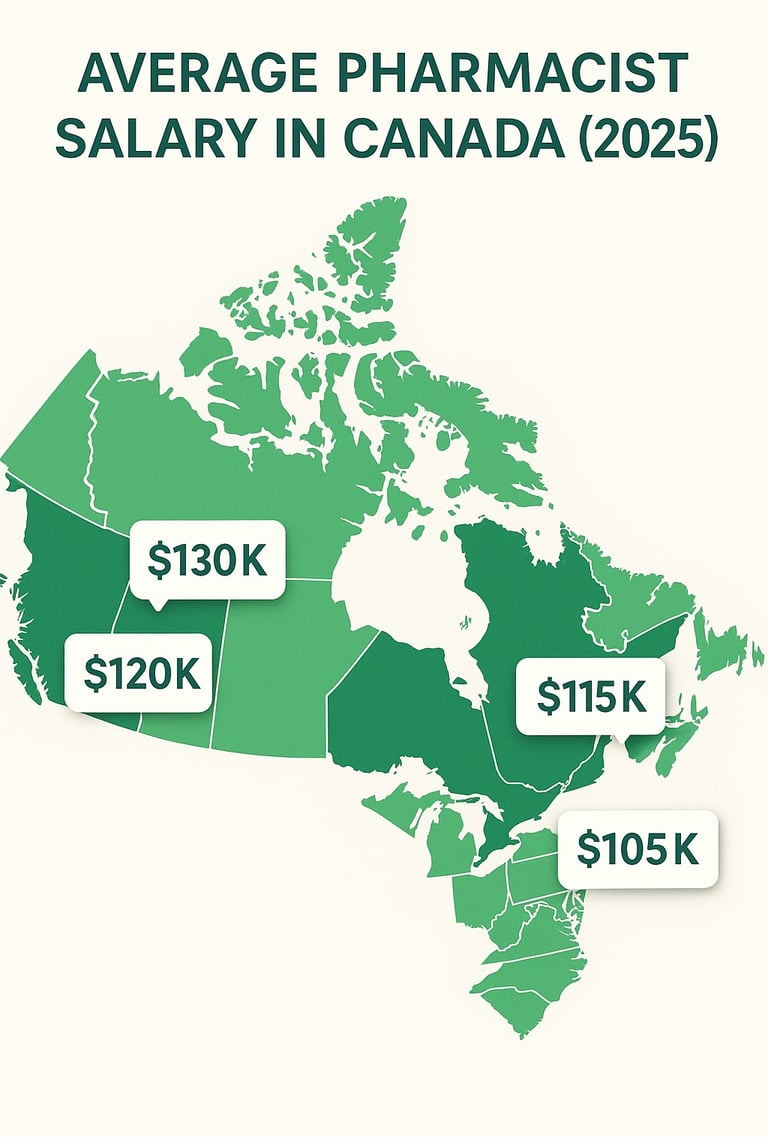

How to earn as a Pharmacist Salary in Canada
Pharmacist salaries in Canada are influenced by several factors, including experience, education level, and work setting. Hospital pharmacists often earn more than those in retail settings due to the complexity of their roles.
Provincial regulatory requirements also impact salary potential, as training and supervision standards vary by different provinces. Recognizing these factors can help pharmacists navigate their careers and maximize earnings.
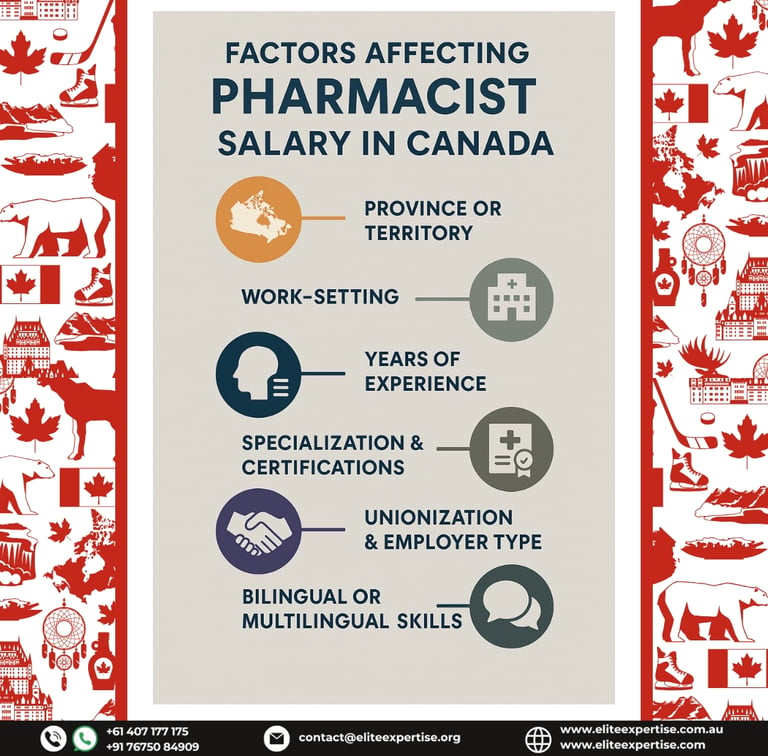

Factors affecting pharmacist salary in Canada, including education and experience.
What is Experience and Education Level needed to earn more
Experience has a significant influence on pharmacist salaries in Canada. The financial benefits of experience highlight the value of long-term commitment to the profession. For example:
Education level also significantly impacts salary. Pharmacists with additional certifications or specialized training usually command higher salaries. Pharmacy programs prepare pharmacists for diverse professional challenges.
Who are payed more in Canada ?
Pharmacists can work in various sectors, each offering different salary potential:
Hospital pharmacist vs Retail pharmacy vs industrial pharmacy
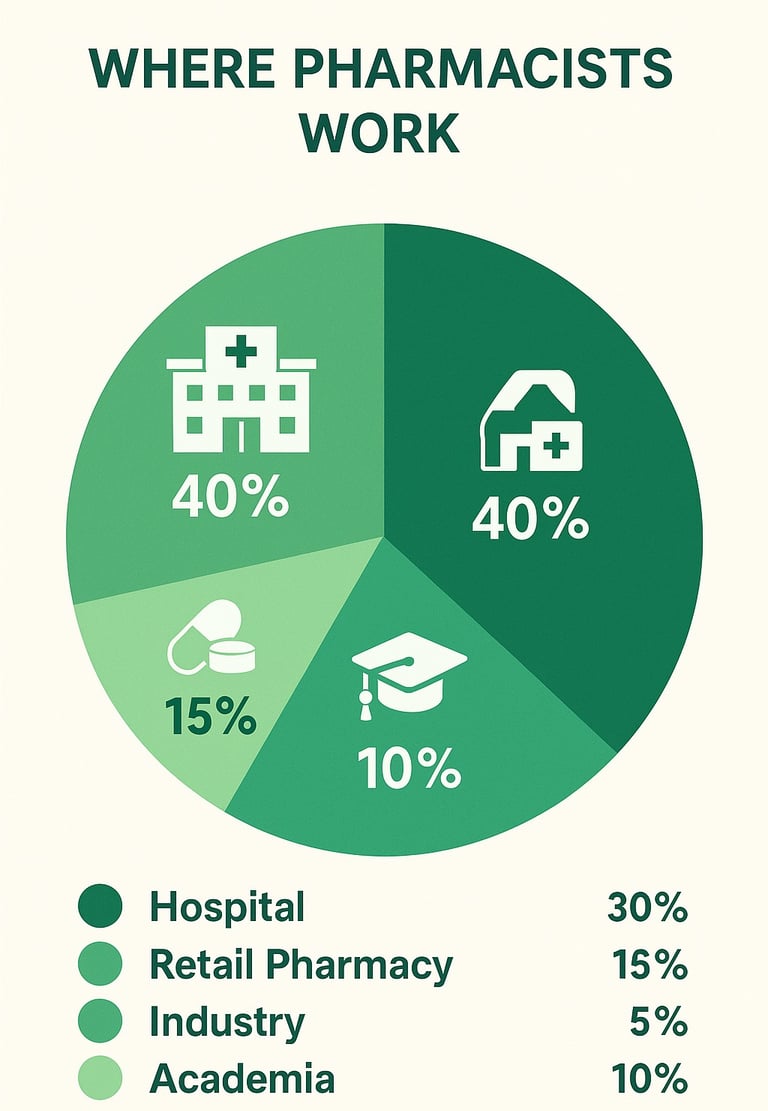

Hospital pharmacists often pharmacists earn more due to the complexity and responsibilities of their roles, including critical medication management and patient safety tasks.
Retail pharmacists, working in community pharmacies, may earn less than hospital pharmacists but play a vital role by dispensing medications, offering health advice, and managing medication therapy. This variety allows pharmacists to choose career paths that suit their interests and goals.
Provincial Regulatory Requirements
Provincial regulatory requirements greatly impact pharmacist salaries in Canada. Key factors include:
Each province has its own licensing and practical training requirements, affecting income potential.
Practical training hours vary by province, influencing how quickly a pharmacist can become licensed and start earning.
Supervision by a licensed pharmacist during training adds further complexity.
Meeting these provincial requirements is crucial for maximizing earnings. Compliance with local regulations ensures pharmacists are well-prepared and qualified, leading to better job opportunities and higher salaries.
Steps to Becoming a Licensed Pharmacist in Canada 2025
To become a licensed pharmacist in Canada, candidates must follow several steps:
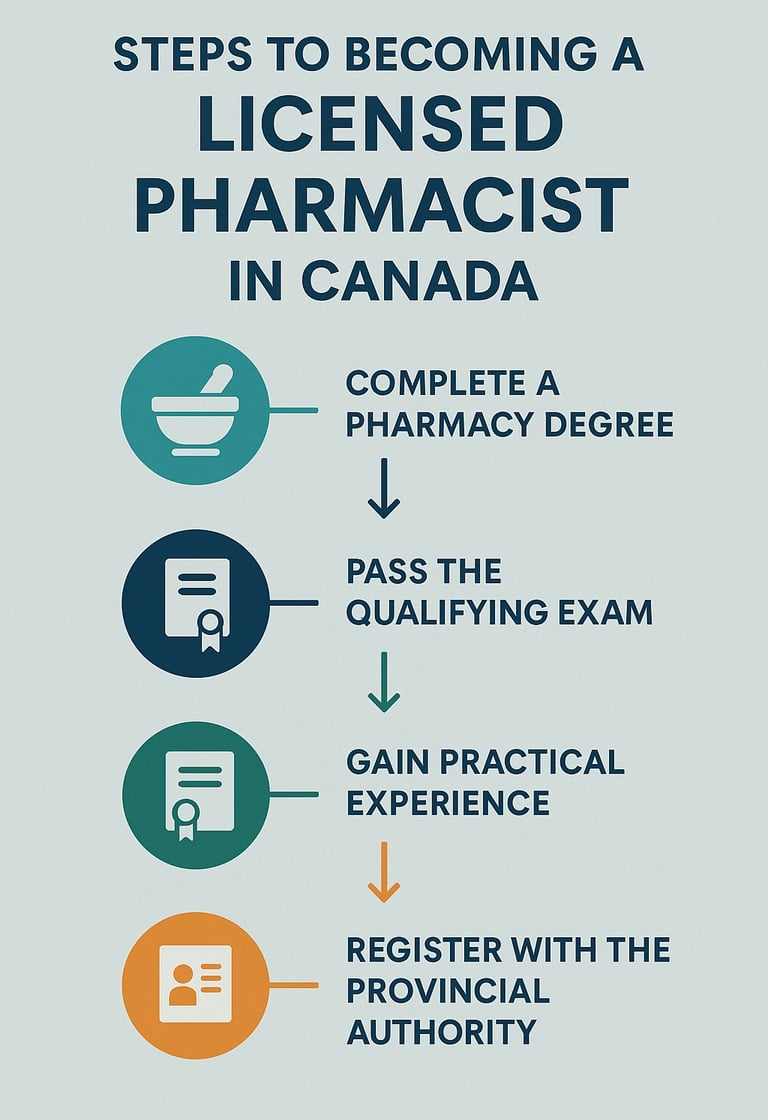

This rigorous process ensures pharmacists are well-prepared to meet Canadians’ healthcare needs and adhere to high professional standards, as emphasized by the Canadian pharmacists association.
Obtain a Pharmacy Degree
Obtain a pharmacy degree (BPharm, PharmD, or MPharm) from a recognized institution.
Complete an accredited program meeting Canadian standards.
Gain comprehensive education in pharmacology, chemistry, and health sciences.
Prepare for the Pharmacy Examining Board of Canada (PEBC) exams and practical training.
Build a strong foundation for a successful pharmacy career in Canada.
Pass the PEBC Exams-the Evaluating exam
Passing both the PEBC Evaluating Exam and the PEBC Qualifying Exam is essential for becoming a licensed pharmacist in Canada.
All candidates must pass the PEBC Qualifying Exam to obtain licensure as a pharmacist in Canada.
Here's a brief overview of each:
Both exams are mandatory steps in the licensure process and must be successfully completed before proceeding to practical training and provincial registration. Pharmacists must demonstrate proficiency in English or French, often requiring tests such as IELTS or TOEFL.
Elite Expertise offers comprehensive training for the PEBC Evaluating Exam, enabling candidates to prepare effectively for the assessment and increase their chances of success.
Complete Practical Training
Complete structured practical training or internships after passing PEBC exams.
Gain hands-on experience under supervision of a licensed pharmacist.
Practical training requirements vary by province, affecting timeline and salary potential.
Meet provincial licensing requirements by completing training hours and applying for licensure.
Once licensed, start professional career contributing to healthcare and earning rewards.
Job Opportunities and Demand for Pharmacists in Canada
The job market for pharmacists in Canada is strong due to an aging population and increased healthcare focus. Canada's healthcare sector is experiencing an annual growth rate of 3.3%.
Approximately 90% of pharmacy graduates in Canada secure employment after graduation.
Being aware of job trends helps pharmacists make informed career decisions and benefit from high demand.
Current Job Market Trends insights according to the average pharmacist salary
The current job market for pharmacists in Canada is strong, with high demand and excellent employment prospects. Key points include:
Approximately 90% of pharmacy graduates secure jobs.
Provinces such as Alberta, Saskatchewan, British Columbia, Prince Edward Island, and Nova Scotia offer abundant opportunities.
Between 2022 and 2031, around 20,000 job seekers are expected to fill pharmacist positions.
The growing healthcare needs of an aging population and advancements in the pharmaceutical industry drive demand.
This positive outlook makes pharmacy a rewarding career choice with competitive salaries and ample job opportunities..
Future Outlook of healthcare professionals
The future outlook for pharmacists in Canada is positive, with robust job market growth projected. An aging population and increasing healthcare demands are key drivers, ensuring steady demand for pharmacists, according to Statistics Canada.
Immigration Process for International Pharmacists
International pharmacists aiming to work in Canada must navigate a specific immigration process, including:
Eligibility checks through programs like the Federal Skilled Worker Program (FSWP)
To immigrate through Express Entry, candidates must create an online profile that includes their credentials and qualifications. Receiving an Invitation to Apply (ITA) for permanent residence is based on a candidate's Comprehensive Ranking System (CRS) score and the demand for their occupation.
Pharmacists can also pursue immigration through Provincial Nominee Programs (PNPs) specific to their province of choice.
Candidates must demonstrate language proficiency in English or French to meet immigration and licensing requirements.
Internationally trained pharmacists must have their credentials assessed by the Pharmacy Examining Board of Canada (PEBC)
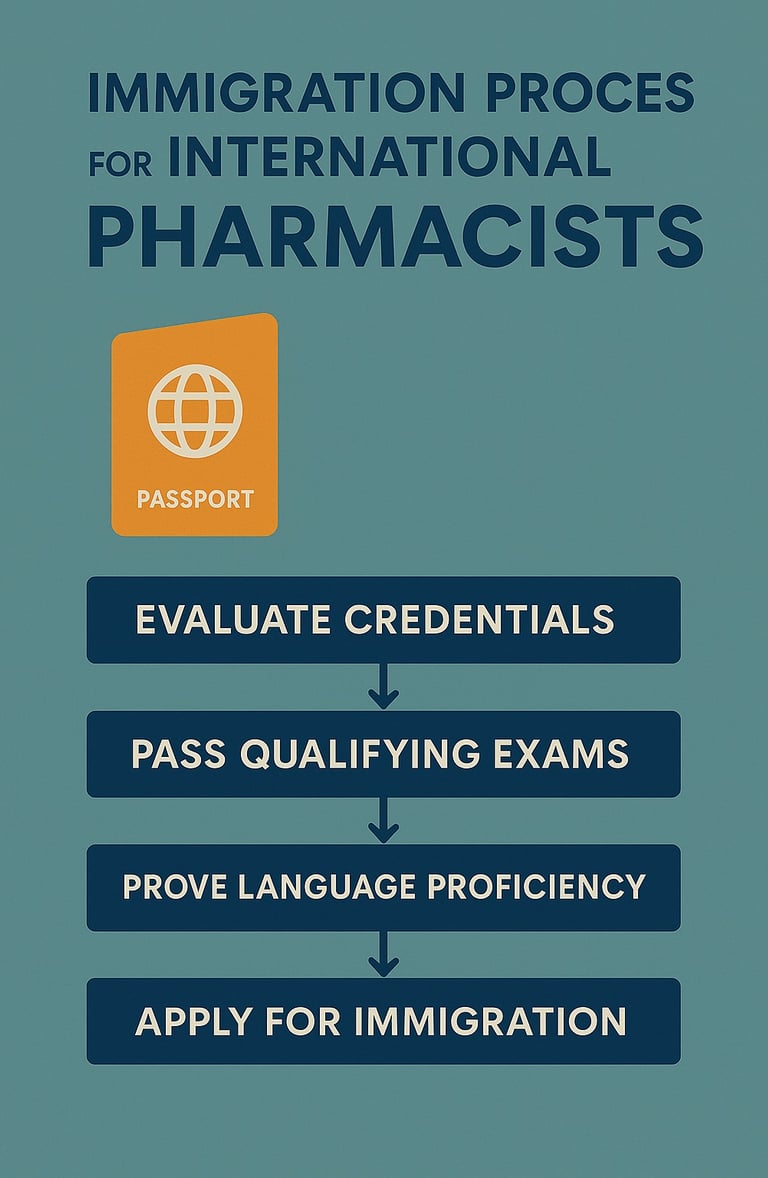

Understanding these steps is crucial for international pharmacy graduates pursuing a step by step process for careers in Canada.
Roles and Responsibilities of Canadian Pharmacists
Pharmacists in Canada are key healthcare professionals working in settings like community pharmacies and hospitals. They dispense medications, provide patient consultations, and ensure safe medication practices, playing a crucial role in patient care and health outcomes across the country. Pharmacists must register with a provincial regulatory authority to obtain a license to practice in Canada.
Comparison of Community Pharmacist and Hospital Pharmacist Roles
Conclusion
Understanding the factors influencing pharmacist salaries in Canada, the steps to becoming a licensed pharmacist, and the various job opportunities available provides a clear picture of the profession’s landscape in 2025. The demand for skilled pharmacists remains high, driven by an aging population and increasing healthcare needs. Continuous professional development and staying updated with industry changes are essential for career advancement. By navigating these aspects effectively, pharmacists can enjoy a rewarding and financially stable career. The future looks promising for pharmacists in Canada, with numerous opportunities to make a significant impact on healthcare.


About the Author
Krupa Karamchand
Content Writer | Elite Expertise
Krupa Karamchand is a B. Pharm graduate and KAPS-qualified pharmacist with over 7 years of experience in the pharmaceutical field. As an experienced SEO content writer, she combines her in-depth healthcare knowledge with proven digital strategies to create informative, engaging, and search engine–optimized blogs. Krupa is passionate about making complex medical topics easy to understand and accessible to all readers.
Follow On
Follow Us
+91 76750 84909
Privacy Policy | © 2025 Elite Expertise . All Rights Reserved.
ELITE EXPERTISE PTY. LTD (ABN: 15668292439) (ACN: 668292439)
Australian Statutory Education License: OPP 2025 ELITE EXPERTISE PTY. LTD
Disclaimer
Elite Expertise is an online education platform dedicated solely to providing coaching and preparation services for the OPRA, PEBC, PSI and PTE exams. We do not offer any sponsorship or migration services. All information provided on our platform is for educational purposes only and should not be interpreted as legal or immigration advice. For inquiries regarding sponsorship, visa applications, or migration services, please consult with licensed immigration professionals or relevant authorities.
Elite Expertise is a trusted and results-driven training platform specializing in preparation for international pharmacist licensing exams. Our comprehensive courses, expert instructors, and proven methodologies have helped countless pharmacy professionals achieve their goals and succeed in competitive regulatory exams. We are proud of our strong success rate and commitment to excellence.
Elite Expertise is an independent training provider. We are not affiliated with any global pharmacy regulatory authorities or official exam-conducting bodies.
Copyright © 2026 Elite Expertise. All rights reserved.
Address
Unit 1/73 Beverley St, Doncaster East VIC 3109, Australia
